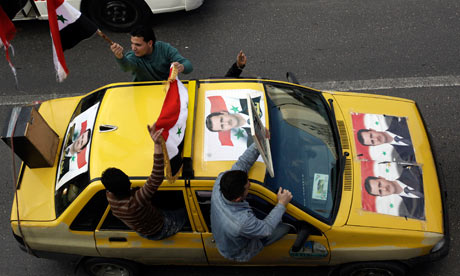Assad’s popularity, Arab League observers, US military involvement: all distorted in the west’s propaganda war
Jonathan Steele
The Guardian
August 31, 2013
Suppose a respectable opinion poll found that most Syrians are in favour of Bashar al-Assad remaining as president, would that not be major news? Especially as the finding would go against the dominant narrative about the Syrian crisis, and the media considers the unexpected more newsworthy than the obvious.
Alas, not in every case. When coverage of an unfolding drama ceases to be fair and turns into a propaganda weapon, inconvenient facts get suppressed. So it is with the results of a recent YouGov Siraj poll on Syria commissioned by The Doha Debates, funded by the Qatar Foundation. Qatar’s royal family has taken one of the most hawkish lines against Assad – the emir has just called for Arab troops to intervene – so it was good that The Doha Debates published the poll on its website. The pity is that it was ignored by almost all media outlets in every western country whose government has called for Assad to go.
The key finding was that while most Arabs outside Syria feel the president should resign, attitudes in the country are different. Some 55% of Syrians want Assad to stay, motivated by fear of civil war – a spectre that is not theoretical as it is for those who live outside Syria’s borders. What is less good news for the Assad regime is that the poll also found that half the Syrians who accept him staying in power believe he must usher in free elections in the near future. Assad claims he is about to do that, a point he has repeated in his latest speeches. But it is vital that he publishes the election law as soon as possible, permits political parties and makes a commitment to allow independent monitors to watch the poll.
Biased media coverage also continues to distort the Arab League’s observer mission in Syria. When the league endorsed a no-fly zone in Libya last spring, there was high praise in the west for its action. Its decision to mediate in Syria was less welcome to western governments, and to high-profile Syrian opposition groups, who increasingly support a military rather than a political solution. So the league’s move was promptly called into doubt by western leaders, and most western media echoed the line. Attacks were launched on the credentials of the mission’s Sudanese chairman. Criticisms of the mission’s performance by one of its 165 members were headlined. Demands were made that the mission pull out in favour of UN intervention.
The critics presumably feared that the Arab observers would report that armed violence is no longer confined to the regime’s forces, and the image of peaceful protests brutally suppressed by army and police is false. Homs and a few other Syrian cities are becoming like Beirut in the 1980s or Sarajevo in the 1990s, with battles between militias raging across sectarian and ethnic fault lines.
As for foreign military intervention, it has already started. It is not following the Libyan pattern since Russia and China are furious at the west’s deception in the security council last year. They will not accept a new United Nations resolution that allows any use of force. The model is an older one, going back to the era of the cold war, before “humanitarian intervention” and the “responsibility to protect” were developed and often misused. Remember Ronald Reagan’s support for the Contras, whom he armed and trained to try to topple Nicaragua’s Sandinistas from bases in Honduras? For Honduras read Turkey, the safe haven where the so-called Free Syrian Army has set up.

